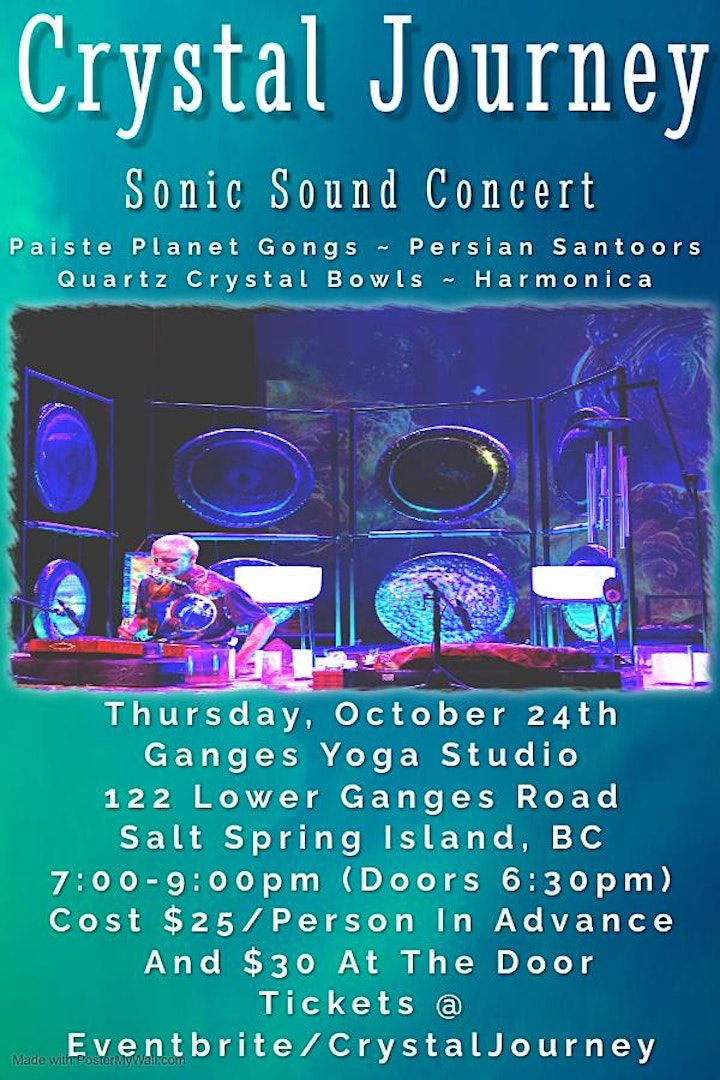
About this Event
Thursday, October 24th
Ganges Yoga Studio
122 Lower Ganges Road
Salt Spring Island, BC
7:00-9:00pm (Doors 6:30pm)
Cost $25/Person In Advance $30 At The Door
Tickets At Eventbrite And At The Door
Bring A Yoga Mat Or Blanket
What You Can Expect From Crystal Journey:
David's set up includes 6 Quartz Crystal Bowls, 8-10 Paiste Planet Gongs, 2 Santoors & Harmonica. Occasionally David Uses His Vocals To Create Harmonized Chants.
Nothing is amplified, pre-recorded or rehearsed. Each set and performance is sonically pure, unique and completely improvised.
www.crystaljourney.ca
For more info about the music.
____________________________________________
About The Instruments:
Paiste Gongs:
Planet Gongs are tuned to the natural harmonic series based on the orbital properties of the Earth, Moon, Sun, and Planets. All of these gongs resonate in harmony with the celestial bodies and communicate a distinct aspect of the Music of the Spheres, which was first documented by Pythagoras in the 6th Century BC. Each planet gong contributes a vital pitch to the total harmonic resonance of our solar system.
Crystal Bowls:
The bowls are made of 99.992% crushed quartz crystal that is heated to 4000 degrees in a centrifugal mold. The thickness of the bowl determines the note, digitally tuned to C D E F G A and B corresponding to the charkas, our energy centers; root (C), sacral (D), solar plexus (E), heart (F), throat (G), third eye (A), and crown (B). The diameter of the bowl determines the pitch, ranging from 6 inches to 22 inches.
The archetype of the instrument may be seen in a harp, carried horizontally and struck with two sticks, found in iconographical documents of the ancient Babylonian (1600-911 BCE) and neo-Assyrian (911-612 BCE) eras.
Persian Santoor:
Persian Santoor consists of a trapeziform case made of walnut wood, approximately 90 cm wide at the broad end, 36 cm wide at the narrow end and 6 cm deep. The strings are fixed to hitch-pins along the left-hand side and wound round metal wrest-pins on the right by means of which they are tuned with a tuning-key (Tuning Wrench). Each quadruple set of strings rests on a movable bridge of hardwood (kharak). The bridges are placed so that the strings are divided into three sections, giving the fundamental note and two higher octaves.
There are nine (or sometimes 10, 11 and 12) quadruple strings an either side so that, with 18 groups of strings, 27 different notes can be played. The bass strings are of brass or copper and the trebles of steel.
Persian Santoor is played by striking the strings with two light hammers (mezrab) held in three fingers of each hand. The ends of the sticks are usually covered with cloth to soften their impact on the strings.
Harmonica:
The harmonica, also known as a French harp or mouth organ, is a free reed wind instrument used worldwide in many musical genres, notably in blues, American folk music, classical music, jazz, country, and rock and roll. There are many types of harmonica, including diatonic, chromatic, tremolo, octave, orchestral, and bass versions. A harmonica is played by using the mouth (lips and tongue) to direct air into or out of one or more holes along a mouthpiece. Behind each hole is a chamber containing at least one reed. A harmonica reed is a flat elongated spring typically made of brass, stainless steel, or bronze.

Event Venue & Nearby Stays
Ganges Yoga Studio, 122 Lower Ganges Road, Salt Spring Island, Canada
CAD 27.96
